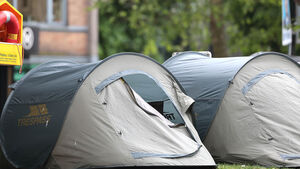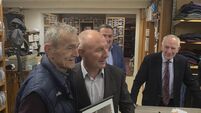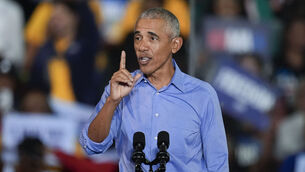Kettle's Boyled: We’re all in a race, the human race

Tents still remain along the Grand Canal after a number of asylum seekers were removed to government accommodation sites. Photograph: Leah Farrell / © RollingNews.ie
Many years back, not long after the toxic tide of the Soviet Union receded from Eastern Europe, I found myself working on a project in a former Soviet country. The effects of 45 years of totalitarian rule, along with the corruption of the Russian Mafia elite, had left its mark not only on the landscape but also on the people. There was still a fear of authority, that if you said something that criticised the government you would be in trouble.
A local colleague used to wryly refer to the time ‘when our Russian brothers were here,’ but it was clear he was glad to see the back of them. He had worked in the navy and had a smattering of English, so he was a good link between the Irish and the local workers, and he was the person who first told us about the anekdoti. These were jokes from communist times, one of the ways that colonised and oppressed people found humour in the blackest of situations. But unlike here, telling an anekdot could land you in prison.
We were treated with suspicion by the local workers, they didn’t understand us or our ways. We worked separately, and at lunchtime we sat apart, eyeing each other up from a distance. But the anekdoti were the key to crack the invisible barrier between us. With the help of my English-speaking friend, we traded Soviet anekdoti for ‘Paddy Englishman’ jokes. They began to laugh at ours, and we at theirs. After a week, we were swopping equipment and learning bits of each other’s languages. People are people, we’re all human and we can all get along, if we try.
One anekdot asked ‘what is the difference between Capitalism and Communism?’ The punchline was that in a capitalist society man exploits man, and in a communist society it is the other way around. I still remember that one, and the laughs that helped bring people together.
I feel sad when I hear protestors screaming ‘get them out’ at new arrivals to Ireland. Many of these people have been delivered here by traffickers who promised them a better life in exchange for a hefty fee, and they want to work and earn a living. Others are fleeing wars, the kind of hell we cannot imagine. But whatever reason brings them here, they are people, like us, and they should be treated with respect.
By all means we can ask that people make an effort to fit in, even if it means leaving behind some of their customs where these do not respect women for instance. But even if an immigrant is not here legally and must be deported, a bit of a respect for the person is the least we can provide. We are all human, and we must never forget that.






